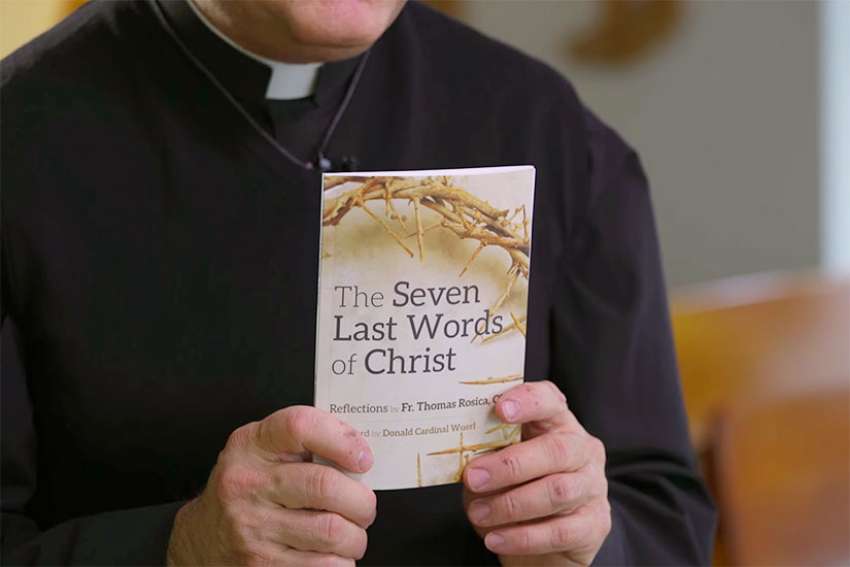Fr. Thomas Rosica tells us how Jesus remained turned towards the needs of His disciples, even during His torments. This, Rosica writes, makes Jesus “the insurgent, the revolutionary of kindness, tenderness, compassion, consolation, forgiveness and care for others.” This book of reflections suggests ways we can imitate Christ’s example in our daily lives.
Rosica is familiar to Canadian Catholics as director of the Newman chaplaincy at the University of Toronto in the 1990s, organizer of Toronto’s 2002 World Youth Day, CEO of Salt + Light Catholic Media and, most recently, English-language media attaché to the Vatican’s press office. All these roles tell us something about Rosica’s gifts as a scholar, pastor and communicator. His talents shine through in his reflections for Lent and Good Friday.
The “seven last words” are the phrases that Christ uttered from the cross:
o “Father, forgive, them; they do not know what they are doing.” (Luke 23:34)
o “Today you will be with me in paradise.” (Luke 23:43)
o “Woman, here is your son … Here is your mother.” (John 19:27)
o “My God, my God, why have you forsaken me?” (Matthew 27:46)
o “I am thirsty.” (John 19:28)
o “It is finished.” (John 19:30)
o “Father, into your hands I commend my spirit.” (Luke 23:46)
The reflection on each phrase is only a few pages long. But Rosica packs those pages with triggers to the imagination and challenges to the mind and heart — touchstones of good spiritual writing.
Though informed by the author’s deep study of Scripture, these reflections are neither scholarly nor abstract. He uses his learning to great effect to bring out the living message of the verses and to keep them personal.
The scene of each verse and the perspective of each evangelist are lightly sketched. He also draws lessons from recent popes, especially Pope Francis. But his references to the popes come more often from their prayers and sermons than from encyclicals. Likewise, he includes eloquent snippets from other authors, ranging from Sr. Helen Prejean to Toni Morrison.
Rosica is a personable priest who lives his vocation through friendships. It is no surprise that he presents the examples of real people — friends, acquaintances and people he admires. Some of Rosica’s examples have lived out Christ’s radical teaching heroically, such as Mother Teresa or the survivors of atrocities. Other examples are more mundane and so closer to our reality. He uses simple stories about ordinary people such as the parent, the lover and the doubting parishioner.
Rosica’s reflections begin with Pope Francis’ poignant prayer during the Stations of the Cross at Rome’s Colosseum in 2016. Francis’ stations pointed out the many selfish crosses of our day — corrupt officialdom, terrorism, heard-heartedness and negligence. Good people can feel defeated or scandalized by these crosses. But Francis also presents those who take up the cross through their love of others — volunteers, consecrated men and women, struggling families, dreamers and lovers.
Rosica’s thought-provoking reflections are intended as a companion for Lent, but they offer perennial insights for our times. Today, in the face of economic and political upheavals, it is tempting to retreat from others, to put up barriers and to talk tough. Christ’s radical response in His darkest hour wasn’t tough talk. Instead, He gave us loving words and an example that summed up His whole ministry.
(Marc B. Cels is an assistant professor of history at Athabasca University in Alberta and researches medieval religion.)


